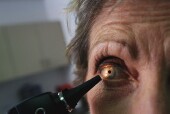
TUESDAY, June 1 (HealthDay News) — A widely prescribed type of antidepressants known as selective serotonin reuptake inhibitors (SSRIs) appear to boost the risk for developing cataracts among seniors, according to the first study to explore the subject.
The increase in risk, reported in the June issue of the journal Ophthalmology, was calculated to be approximately 15 percent, the researchers found.
At that rate, 22,000 Americans would theoretically develop cataracts as a result of their antidepressant use, the study authors noted.
The research team, led by Mahyar Etminan of the Vancouver Coastal Health Research Institute in Canada, analyzed data concerning almost 19,000 patients over the age 65, and compared the findings to data from 190,000 men and women in the same age group not taking antidepressants.
Strong links to cataract risk were found for three specific SSRI drugs: fluvoxamine (Luvox), venlafaxine (Effexor) and paroxetine (Paxil), the researchers found. Each contributed to an elevated risk of 39 percent, 33 percent and 23 percent, respectively.
However, rising risk was only associated with the current use of such medications, not prior use, the authors noted.
Etminan’s team further observed that not all antidepressants appeared to be linked to an increased risk for cataracts, although they noted that the lack of an association was not definitive proof that there is in fact no risk.
“The eye’s lens has serotonin receptors, and animal studies have shown that excess serotonin can make the lens opaque and lead to cataract formation,” Etminan said in a news release from the American Academy of Ophthalmology. “If our findings are confirmed in future studies, doctors and patients should consider cataract risk when prescribing some SSRIs for seniors.”
More information
For more on cataract risk, visit the U.S. National Eye Institute.

